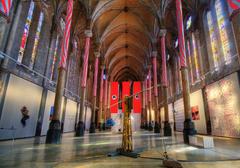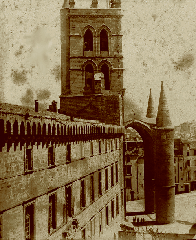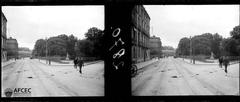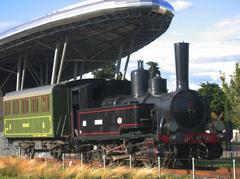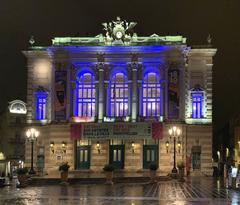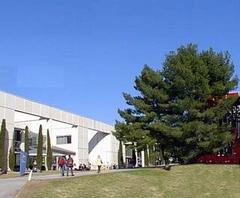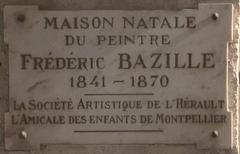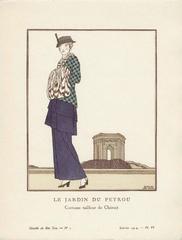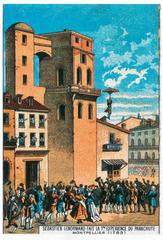Faculté De Théologie Protestante (Montpellier, France)
Faculté de Théologie Protestante Montpellier: Visitor Guide, History, and Practical Information
Date: 03/07/2025
Introduction
The Faculté de Théologie Protestante in Montpellier is a cornerstone of French Protestant history, theological scholarship, and cultural heritage. Located at 13 rue Louis-Perrier, near the heart of Montpellier, this institution has evolved from its 16th-century Reformation roots into a vibrant academic and cultural center. It welcomes not just students and scholars, but anyone interested in the enduring legacy of Protestantism in France and the city’s rich religious history.
This comprehensive guide presents an in-depth look at the faculty’s historical evolution, academic significance, architectural features, visitor information—including hours, ticketing, accessibility, and guided tours—as well as tips for exploring nearby cultural attractions. Whether you are a researcher, theology student, or cultural tourist, this resource will help you plan a meaningful visit.
Table of Contents
- Historical Overview
- Academic and Cultural Significance
- Visitor Information
- How to Get There
- Nearby Attractions
- Visitor Tips and Etiquette
- Frequently Asked Questions (FAQ)
- Summary and Call to Action
- References and Official Links
Historical Overview
Reformation Roots and Early Years
The story of the Faculté de Théologie Protestante Montpellier begins in the 16th century, during the Protestant Reformation, as French Huguenots sought to establish centers for theological education. Founded in 1596 as the Académie Réformée de Montpellier, the institution was part of a network of Protestant academies that emerged after the Edict of Nantes (1598), which granted religious rights to Protestants in France. Alongside Montauban and Saumur, Montpellier’s academy became a crucial hub for Protestant intellectual and spiritual life (IPT Montpellier PDF, p.2–3).
Suppression and Survival
The Revocation of the Edict of Nantes in 1685 led to the closure of Protestant institutions and widespread persecution. Many faculty members and students fled or practiced in secret. It was not until the Edict of Tolerance (1787) that Protestants regained the right to worship and educate openly (IPT Montpellier PDF, p.12).
19th–20th Century Developments
Napoleon’s legal reforms in the early 19th century permitted the re-establishment of Protestant theological faculties, and in 1808, the faculty was reconstituted in Montauban. By 1919, seeking a dynamic intellectual environment, it relocated to Montpellier. The faculty became independent following the 1905 law separating church and state, and eventually helped shape the Institut Protestant de Théologie (IPT) alongside its Paris counterpart (IPT Montpellier PDF, p.2, 34; Antigone des Associations).
The Modern Era and IPT
Since 1972, the IPT has united Protestant theological education in France. Recognized as a private higher education institution of general interest (EESPIG), IPT offers academic programs in Montpellier and Paris, supported by major Protestant churches (IPT Montpellier PDF, p.34).
Academic and Cultural Significance
The faculty is renowned for rigorous academic programs spanning biblical studies, theology, church history, ethics, and practical ministry—offered from bachelor’s to doctoral levels, both in-person and via distance learning (course programs). It also provides specialized diplomas in chaplaincy, mediation, and secularism (Antigone des Associations).
As a leading center for Protestant scholarship, the faculty is deeply involved in ecumenical dialogue, research, and public engagement. It collaborates with University Paul-Valéry Montpellier 3, hosts public lectures, conferences, exhibitions, and annually publishes the journal “Études théologiques et religieuses” (IPT Montpellier PDF).
Visitor Information
Visiting Hours
- General Opening: Monday to Friday, 9:00 AM–6:00 PM (academic year).
- Library: Open to researchers and visitors; advance inquiry recommended.
- Events: Public lectures, open days, and special events, especially during European Heritage Days.
- Note: The faculty is an academic institution; public access may be limited outside special events. Always check the official IPT website or contact the administration for the latest updates.
Admission and Tickets
- Admission: Free for public events, library visits, and most special programs.
- Guided Tours: Available during special occasions (e.g., European Heritage Days) or by appointment, especially for groups.
- Registration: Some lectures or exhibitions may require pre-registration.
Guided Tours
- Booking: Contact the faculty in advance via the IPT website.
- Content: Tours explore the faculty’s architecture, library, and Protestant history in Montpellier.
Accessibility
- Mobility: The modern annex and main building are accessible to visitors with reduced mobility.
- Parking: Limited; public transport is recommended.
- Assistance: For specific accessibility needs, contact the faculty in advance.
Facilities and Amenities
- Library: Houses a significant collection of Protestant theological works and rare archives.
- Study Spaces: Quiet areas for research and reflection.
- Events: Regular lectures, conferences, and exhibitions.
- Photography: May be restricted; always seek permission.
How to Get There
- Address: 13 rue Louis Perrier, 34000 Montpellier, France
- Public Transport: Tram lines and city buses serve the nearby “Saint-Denis” stop.
- Parking: Public parking is limited; nearby city lots are available.
- Cycling: Bike rental stations are located throughout central Montpellier.
Nearby Attractions
- Place de la Comédie: Montpellier’s main square with historic opera house and vibrant cafés.
- Musée Fabre: Major art museum with collections spanning Renaissance to modern art.
- Saint-Pierre Cathedral: Iconic Gothic cathedral.
- Jardin des Plantes: France’s oldest botanical garden, founded in 1593.
- Montpellier’s Old Town: Medieval streets and preserved architecture.
- Other Protestant Sites: Former Protestant temples and the Protestant cemetery.
Visitor Tips and Etiquette
- Check Schedules: Always verify visiting hours and event times in advance (official site).
- Appointments: Recommended for library or archive access.
- Dress Modestly: Especially when attending academic or religious functions.
- Respect Privacy: Seek permission before taking photos.
- Language: French is the primary language; limited English support may be available.
Frequently Asked Questions (FAQ)
Q: What are the regular visiting hours?
A: Monday to Friday, 9:00 AM–6:00 PM during the academic year, but public access outside events is limited.
Q: Is there an entry fee?
A: No, entry is free for public events and the library.
Q: Are guided tours available?
A: Only by appointment or during special events.
Q: Is the faculty building accessible for visitors with disabilities?
A: Yes, most modern facilities are accessible.
Q: How do I book a visit or tour?
A: Contact the faculty via the IPT website.
Q: Can tourists use the library?
A: The library welcomes visitors, but researchers and students have priority. Confirm access in advance.
Q: Are there nearby attractions?
A: Yes, including Musée Fabre, Place de la Comédie, Saint-Pierre Cathedral, and more.
Summary and Call to Action
The Faculté de Théologie Protestante Montpellier is a living testament to four centuries of Protestant heritage, academic achievement, and cultural vitality. It stands as both a historic monument and an active center for theological dialogue and research. With free access to public events, occasional guided tours, and central location, it offers a unique perspective on the religious and intellectual life of Montpellier.
For the latest event schedules, accessibility details, and visitor information, consult the Institut Protestant de Théologie official website. Enhance your exploration of Montpellier’s religious and cultural heritage with the Audiala app, which offers guided tours and up-to-date local insights.
Immerse yourself in the enduring legacy of Protestantism—plan your visit to the Faculté de Théologie Protestante and discover the vibrant history that continues to shape Montpellier today.
References and Official Links
- Institut Protestant de Théologie
- IPT Montpellier PDF – History and Visitor Info
- Faculté de Théologie Protestante de Montpellier, Official Page
- IPT Course Programs and Contact
- 2024-2025 IPT Montpellier Program PDF
- Antigone des Associations – IPT Montpellier
